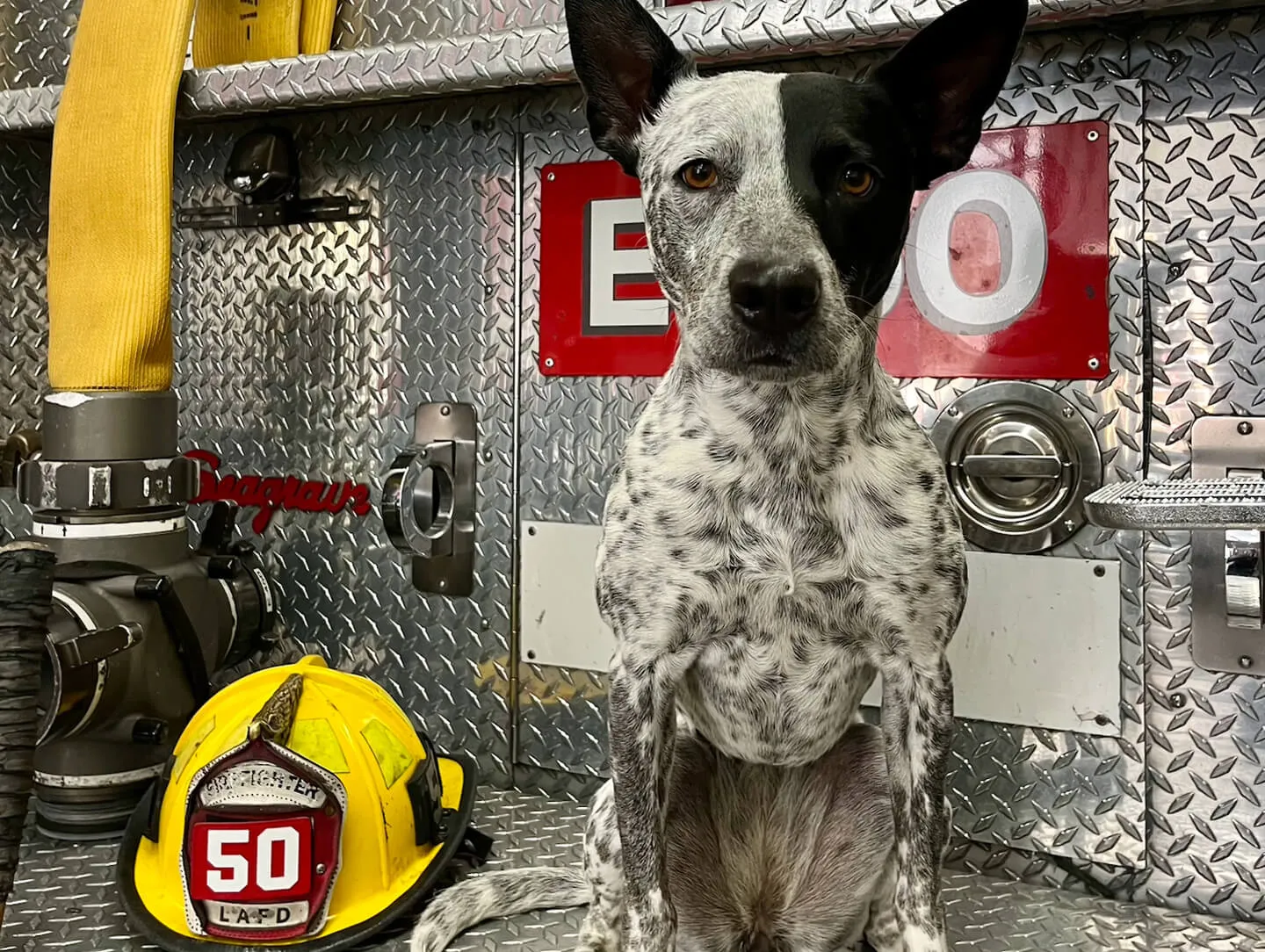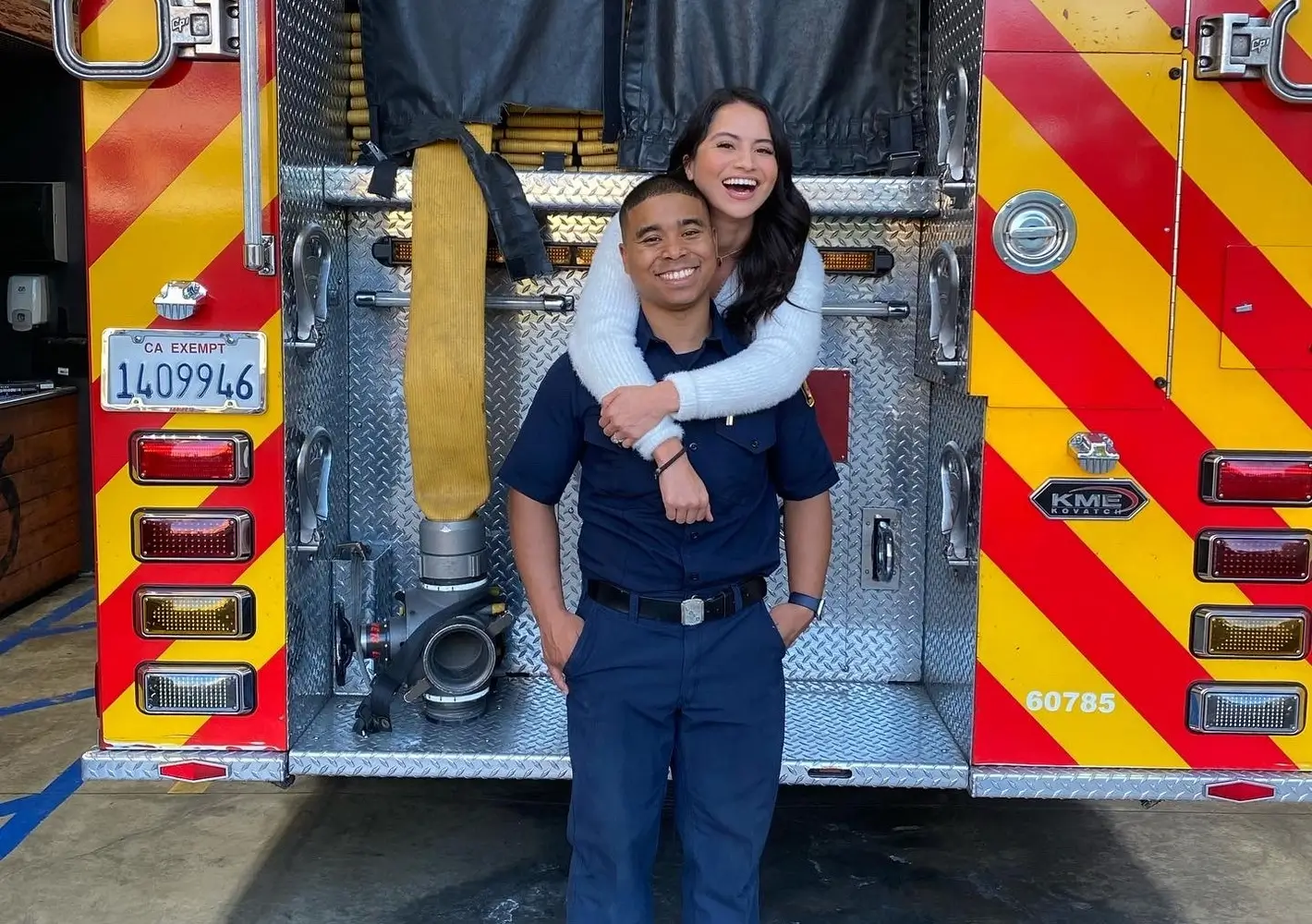The Foundation Heat
Welcome to the LAFD Foundation blog, "The Foundation Heat," where you'll find unique LAFD perspectives and engaging firefighter stories.

Subscribe to our monthly newsletter so you never miss a feature
.jpg)
The Fast Response Vehicle (FRV) program was launched to address the growing need for swift emergency response and more availability for larger fire apparatus. More than a decade later, FRVs have become one of the LAFD’s most effective and flexible response resources as the Department continues to face unprecedented strain.
Jan 29, 2026
.jpg)
LAFD drones have supported a wide range of incidents, from fires to hazardous materials (HazMat) emergencies, providing situational awareness without putting firefighters in unwarranted danger.
Jan 29, 2026
.webp)
The following report offers a high-level overview of a much broader, ongoing effort to strengthen the Los Angeles Fire Department (LAFD) in the aftermath of the fires and for any emergency in the years ahead.
Jan 12, 2026

One of LAFD Fire Station 7's go-to firehouse favorites is a hearty tri-tip salad with cornbread that delivers big flavor while keeping things fresh and balanced.
Jan 9, 2026

From early days at various street fairs and community events to today’s large-scale events like CicLAvia, Fleet Week, and the Los Angeles Marathon, the LAFD Bike Team has grown into an essential aspect of the LAFD’s mission to keep Los Angeles safe.
Sep 30, 2025

Firefighters understand the importance of a hearty meal that nourishes both body and spirit. In this month’s Firehouse Eats, LAFD Fire Station 2 in Boyle Heights shares their spin on a Southern classic: the Nashville hot chicken sandwich.
Sep 30, 2025
.webp)
When Sebastian Main was around four to five years old, he looked down at his arms and realized that he did not have a right hand.
Aug 26, 2025
.webp)
For the wildland hand crews that serve Los Angeles through the Los Angeles Fire Department (LAFD), it is a rare occasion to have not one, but six live fires in the midst of training.
Aug 25, 2025
.webp)
Los Angeles Fire Department (LAFD) Captain Jeffrey Brown, who works at LAFD Fire Station 69 in the heart of the Pacific Palisades, was performing routine operations along the Pacific Coast Highway with his members the morning of January 7, 2025.
Jun 30, 2025
.png.webp)
“The incident would have had a very different outcome without the thermal imaging camera,” Los Angeles Fire Department (LAFD) Captain Matt Quealy reflected.
May 29, 2025
.png.webp)
Little did the crew at Los Angeles Fire Department (LAFD) Fire Station 23 in the Pacific Palisades know that their lives and the lives of their neighbors would change forever on January 7, 2025.
Apr 28, 2025
.png.webp)
When Genesis called the LAFD Foundation to inquire about the benefit of a donation of vehicles for the Department, the team was stunned.
Apr 23, 2025
.png.webp)
Los Angeles Fire Department (LAFD) Cadet Finbar Tancraitor had a spring break quite unlike that of his fellow high schoolers. He did get plenty of sunshine and time outside, but not on a sandy beach or at his local park with friends.
Mar 31, 2025
.png.webp)
Firehouse meals serve a purpose much bigger than fueling the bravest among us.
Mar 28, 2025

The Los Angeles Chargers Impact Fund’s Bolt Academy program offered young people the opportunity to experience Black History at the African American Firefighter Museum.
Feb 24, 2025

In the early morning hours of Wednesday, January 8th, Los Angeles Fire Department (LAFD) Captain Christopher Klimpel and a crew from Fire Station 14 were finally headed back to the Pacific Palisades command post.
Feb 21, 2025
.png.webp)
"In firefighting, you’re choosing a career where you’re constantly exposed to traumatic events,” shared Captain Roman Sanchez, a Navy veteran with 23 years on the LAFD. “I knew providing this support to others was my calling.”
Feb 18, 2025
.png.webp)
The whole of Los Angeles is reeling from the impact of the Palisades and Eaton Fires, named the two most destructive fires in the history of the second-largest city in the United States.
Jan 31, 2025
.png.webp)
Dear Firefighter: “I am thankful for your effort in trying to contain and put out the wildfires that have devastated so many communities.”
Jan 20, 2025

LAFD Captain Andy Ruiz has been passionate about fishing his whole life, having spent countless hours on the water with his brothers and father.
Jan 7, 2025
.png.webp)
“If we have the technology, why would we not want it in the field, especially if it’s the best thing for the patient?” asked Los Angeles Fire Department (LAFD) Medical Director Dr. Marc Cohen, who has seen firsthand the challenges of managing airways in both hospital and field settings.
Jan 7, 2025

For Melissa Pompa, running a marathon was much more than completing a personal goal. It was a meaningful way to give back to first responders through the Los Angeles Fire Department (LAFD) Canine Therapy Program.
Oct 31, 2024
%20(1)%20img.webp)
“It’s hard to describe to people that have never experienced it,” Los Angeles Fire Department (LAFD) Captain Thomas Henzgen said of what he saw in Asheville, North Carolina in the wake of Hurricane Helene.
Oct 29, 2024

Recently, I had the unique opportunity to go up to the Bridge Fire with Los Angeles Fire Department (LAFD) Captain Rich Diede to learn more about the LAFD’s wildfire mutual aid efforts.
Sep 30, 2024

At the firehouse, meals are more than just fuel – they’re an opportunity to foster camaraderie and comfort, even during the toughest shifts.
Sep 30, 2024

For some, the flashing lights of a fire engine stir up curiosity, and perhaps even comfort. For Omar Garcia, those lights changed the course of his life.
Aug 31, 2024

The untimely death of an LAFD recruit, an unexpected explosion that landed nine LAFD firefighters in the emergency room, and a firefighter who suffered permanent, severe injuries that required air transport to the closest hospital are just a handful of the Potentially Traumatic Events (PTEs) that LAFD firefighters confronted over the past year.
Aug 7, 2024

“My desire to be a medic, and how I operate in general, comes from my father,” said Los Angeles Fire Department (LAFD) Firefighter/Paramedic (FF/PM) Steven Smith.
Jul 2, 2024
.webp)
Applause shook the auditorium as Quinn Heller made her way to the stage to accept the check from the Los Angeles Fire Department (LAFD) Scholarship Fund at the annual ceremony for scholarship winners.
Jul 2, 2024

Ever wonder why people choose to align themselves with an organization like the Los Angeles Fire Department (LAFD) Foundation?
May 31, 2024

Over 14 days, one of California's most devastating wildfires swept across Los Angeles and Ventura counties, claiming three lives, destroying more than 1,500 structures, and forcing the evacuation of more than 295,000 residents.
May 31, 2024

The Los Angeles Fire Department’s 2024 Howling Hero was separated from her mother as a puppy and found herself in what her owner, Kristen Nystrom, called, “a house of horrors.”
May 1, 2024

“The hair on the back of your neck stands up a little bit,” Captain Elan Raber from Los Angeles Fire Department (LAFD) Fire Station 18 reflected.
Apr 30, 2024

One of the Los Angeles Fire Department’s (LAFD) mottos is “train like your life depends on it, because it does.”
Apr 30, 2024

Amy Yee will never forget receiving the call that her sheepadoodle, Sampson El Calafate, had won the 2023 LAFD Howling Heroes contest.
Mar 29, 2024

Los Angeles Fire Department (LAFD) Fire Station 94 responded to a midnight call in January 2021 for a commercial building fire in Hyde Park.
Mar 29, 2024

The feeling of crawling into bed after a long day, sinking into a comfortable mattress, and pulling the sheets up is familiar to all who have a relative sleep schedule and the privilege of owning a bed.
Mar 1, 2024

There are two things one might not expect to hear at firefighter training: an empathic “YES MA’AM” when responding to leadership commands, and the deep growl of that response coming from a group of teenagers.
Feb 23, 2024

Walk into any Los Angeles Fire Department (LAFD) fire station and firefighters will be ready to respond to any call at a moment’s notice.
Jan 31, 2024

Orpheas, an 8-year-old Maryland resident, is wildly enthusiastic about fire and rescue services.
Jan 31, 2024

For the Los Angeles Fire Department (LAFD), a picture is worth much more than a thousand words.
Jan 31, 2024

Everyone knows firefighters for firefighting, but few fully understand the breadth and scope of what the Los Angeles Fire Department (LAFD) does.
Nov 17, 2023

Though no one is sure who laid the foundation, Fire Station 109 (FS 109) has been known for its garden for longer than its members have been on duty.
Nov 17, 2023

Mike Ahmar is the Executive Chairman of Partners Bank of California, and the President of Ahmar Investment Inc., a prominent real estate development company.
Aug 22, 2023

For pet owners, animals are more than just companions; they are cherished members of our families.
Aug 22, 2023

Standing close to the manicured grass at BMO stadium, Arson Investigator Afara Lalaind waited patiently for her name to be called.
May 22, 2023

A driver races down the 405 on their way to work, weaving from lane to lane in the hopes of saving even a few seconds of travel time.
May 3, 2023

Can you smell a drop of gasoline from across a football field? How about spot the source of a fire to within three inches?
Apr 24, 2023

The Los Angeles Fire Department (LAFD) uses helicopters to combat wildfires, conduct rescues, and provide command and control during emergencies.
Apr 17, 2023

What is it like to be the mascot for one of the largest fire departments in the country? Each year, the Los Angeles Fire Department Foundation opens the Howling Heroes competition to the public.
Apr 12, 2023

It all started in 2004. A local artist named Rosie Tos stopped by her local fire station (LAFD Station 63) in Venice.
Mar 17, 2022

Twenty years ago, LAFD member Steve Hissong recalled a sense of disbelief as he watched the news coverage of a Boeing 767 which had crashed into the North Tower of the World Trade Center in New York City.
Sep 11, 2021

On Tuesday, October 13, 2020, the Los Angeles City Fire Department debuted the first robotic firefighting vehicle in the U.S., putting it to use on its first day in service.
Oct 13, 2020

Meet Dean Ulrich, LAFD Foundation board member and retired LAFD member. Dean spent three and half decades serving the people of Los Angeles.
The Firefighter of the Month program is made possible thanks to the generosity of Marathon Los Angeles Refinery, which donates $750 to each Firefighter of the Month's fire station.

.png)
.png)
Firefighter Of The Month January 2026
Firefighter Robert Lindsay, Fire Station 58, Pico/RobertsonLindsay did not grow up with firefighters in his family or even close friends in the fire service, but in high school, he decided to pursue a career in firefighting. Though it took seven years for that dream to come to fruition, Lindsay never stopped working and taking advantage of every opportunity possible to get closer to his goal.
January 2026


Firefighter Of The Month December 2025
Firefighter/Paramedic Ed Lagunas, Fire Station 38, WilmingtonFirefighter/Paramedic Ed Lagunas reflects on his career-defining experience during the Wilmington explosion, his journey to the LAFD, and his unwavering commitment to serving both his fellow firefighters and the community with courage, compassion, and dedication.
December 2025
.webp)
.webp)
Firefighter Of The Month October 2025
Firefighter/Paramedic Allen Janzen, Fire Station 102, Valley GlenLos Angeles Fire Department (LAFD) Firefighter Allen Janzen’s path to the fire service exemplifies resiliency in the face of setbacks. His journey took nine years, but he never wavered from the dream he’d had since elementary school.
October 2025


Firefighter Of The Month September 2025
Engineer Brandon Colburn, Fire Station 10, DowntownWhile working as an American Medical Response (AMR) paramedic before joining the fire service, Brandon Colburn responded to a stroke victim who was living alone. Having been an Emergency Medical Technician (EMT) since graduating high school at 18, calls like this were exactly what Colburn was trained to handle.
September 2025
.webp)
.webp)
Firefighter Of The Month August 2025
Terrence Hunter, Firefighter, Fire Station 51, LAXLos Angeles Fire Department (LAFD) Firefighter Terrence Hunter has driven the engine at Fire Station 51 out of the station garage and onto the tarmac at Los Angeles International Airport (LAX) more times than he can count.
August 2025
.webp)
.webp)
Firefighter Of The Month July 2025
Carl Weideman, Firefighter/Engineer, Fire Station 55, Eagle RockWhile outside, he heard a boom nearby. He had no idea where it had come from but, true to his nature, wanted to see if anyone needed help.
July 2025


Firefighter Of The Month May 2025
Jason Jasgur, Firefighter/Paramedic Fire Station 114, Air OperationsWhen Jason Jasgur joined the Los Angeles Fire Department (LAFD) in 2014, he never could have imagined that he would be rendering aid to a SWAT officer who had been shot in the face during an active shooter incident.
May 2025


Firefighter Of The Month April 2025
Geoff Balchowsky, Firefighter - Fire Station 44, Cypress ParkA young Geoff Balchowsky, fresh out of high school, was working as a lifeguard when someone disappeared under the water in front of his eyes.
April 2025


Firefighter Of The Month March 2025
Matthew Riveros, Firefighter - Metro Fire Communications, DowntownMatthew Riveros witnessed firsthand the expertise and compassion of Los Angeles Fire Department (LAFD) firefighters at 18 years old when his seven-year-old baby sister had a stroke stemming from a tumor rupturing in her brain.
March 2025


Firefighter Of The Month February 2025
Mark McLean, Haz Mat Firefighter - Fire Station 48, San PedroFrom engineering to firefighting, Mark McLean’s journey is one of resilience and dedication. With over 20 years of service, he specializes in hazardous materials and urban search and rescue, tackling L.A.'s toughest emergencies.
February 2025


Firefighter Of The Month January 2025
Robby Jackson, Apparatus Operator - In-service Training, DowntownOn January 7, 2025, Los Angeles Fire Department (LAFD) Apparatus Operator (AO) Robby Jackson was teaching an auto-extrication class in Sunland, Los Angeles, when he first heard over his radio that there was a fire in the Palisades.
January 2025


Firefighter Of The Month December 2024
Matthew Thompson, Captain I - Fire Station 12, Highland ParkAs a young child, Matthew Thompson loved spending time with his dad, a Los Angeles County firefighter.
December 2024


Firefighter Of The Month November 2024
Quan Tran, Firefighter / Paramedic - Fire Station 81, Panorama CityWith three years on the job, six months as a paramedic, and a 10-week-old baby girl, Los Angeles Fire Department (LAFD) Firefighter/Paramedic Quan Tran is in a constant state of learning and growing.
November 2024


Firefighter Of The Month October 2024
Travis Hill, Apparatus Operator - Fire Station 48, San PedroLos Angeles Fire Department (LAFD) Apparatus Operator (AO) Travis Hill’s father was a 36-year LAFD firefighter and engineer.
October 2024


Firefighter Of The Month September 2024
Ian Vangerpen, Captain - Fire Station 37, WestwoodIan VanGerpen was still a young Marine when he would take the train to Union Station in Los Angeles to visit his brother, a Los Angeles Fire Department (LAFD) firefighter.
September 2024


Firefighter Of The Month August 2024
Cory Meadows, Firefighter - Fire Station 4, Arts DistrictAt the busy Los Angeles Fire Department (LAFD) Fire Station 4 in downtown Los Angeles, located near the Los Angeles County jail, skid row, and five major freeway junctions, one never quite knows what a typical day could look like.
August 2024


Firefighter Of The Month July 2024
Travis Valdez, Firefighter / Engineer - Fire Station 34, Jefferson ParkA young Travis Valdez was riding with his dad heading to baseball practice. Suddenly and shockingly, they witnessed a young girl get hit by a car.
July 2024


Firefighter Of The Month June 2024
Scott Hobbs, Firefighter / Paramedic - Fire Station 20, Echo ParkFor Firefighter/Paramedic (FF/PM) Scott Hobbs, joining the fire service was a childhood dream that never went away.
June 2024


Firefighter Of The Month May 2024
Slater Davies, Firefighter / Paramedic - Fire Station 64, WattsAs a Firefighter/Paramedic (FF/PM) at Los Angeles Fire Department (LAFD) Fire Station 64 in the heart of Watts, Los Angeles, Slater Davies has seen his share of incidents.
May 2024


Firefighter Of The Month April 2024
Jose Rodriguez, Apparatus Operator - Fire Station 60, Valley BureauApparatus Operator (AO) Jose Rodriguez found his way to the fire service through the rough, wildfire-prone terrain of the Angeles National Forest. In 2000, he joined the U.S.
April 2024


Firefighter Of The Month March 2024
David Mack, Captain I - Fire Station 66, South BureauLos Angeles Fire Department (LAFD) Captain I David Mack’s most memorable call, and the call he is most proud of, does not involve something that he did. Rather, it was what he witnessed from his fellow firefighters.
March 2024


Firefighter Of The Month February 2024
Ronald Tomacruz, Firefighter/Engineer - Fire Station 80, LAXIt was Engineer Ronald Tomacruz’s first day at Los Angeles Fire Department (LAFD) Fire Station 80, and he had just been cleared to drive the big rigs that are specially designed for serving the Los Angeles International Airport (LAX).
February 2024


Firefighter Of The Month January 2024
David Hinojosa, Firefighter - Fire Station 14, South CentralFirefighter David Hinojosa, a first-generation U.S.-born citizen and firefighter, grew up in a rough area of Orange County and hails from a family of immigrants.
January 2024


Firefighter Of The Month October 2023
Matthew Davis, Firefighter/Paramedic - Fire Station 50, Atwater VillageAt the heart of Fire Station 50, nestled in Atwater Village, resides Matthew Davis - a firefighter paramedic with over 17 years of service under his belt.
October 2023
.png.webp)
.png.webp)
Firefighter Of The Month Fall 2023
Omar Velasquez, Firefighter/Paramedic - Fire Station 25, Boyle HeightsIn the bustling neighborhood of Boyle Heights in Los Angeles, Fire Station 25 stands as a beacon of hope and assistance for the local community.
September 2023


Firefighter Of The Month Summer 2023
Sean Williams, Firefighter/Engineer - Fire Station 24, Shadow HillsMeet Engineer Sean Williams, a dedicated and seasoned firefighter whose illustrious career spans 32 years and is currently stationed at Fire Station 24, which serves the community of Shadow Hills in Los Angeles, CA.
August 2023


Firefighter Of The Month May 2023
Oscar Cespedes, Firefighter/EIT - Fire Station 98, Valley BureauOscar Cespedes knew from an early age that he wanted to be a firefighter.
May 2023


Firefighter Of The Month April 2023
Daniel Nakamura, Firefighter - Fire Station 33, South BureauFirefighter Daniel Nakamura heard the call toward a life of service at an early age.
April 2023


Firefighter Of The Month Spring 2023
Brian LaBrie, Apparatus Operator - Fire Station 3, Los AngelesGrowing up in Montana, Brian LaBrie knew that his path led to the fire department.
March 2023
.png.webp)
.png.webp)
Firefighter Of The Month February 2023
Shaunna Purkey, Firefighter III - Fire Station 21, South Los AngelesFirefighter Shaunna Purkey is a proud member of the Los Angeles Fire Department (LAFD), serving the residents of South Los Angeles from Fire Station 21.
February 2023
Exclusive updates, inspiring LAFD stories, and more, all on the LAFD Foundation blog.
January 17, 2025
Los Angeles Rams teamed up with L.A.'s 11 other professional sports organizations to host one of three simultaneous major donation...
January 21, 2025
GoFundMe, the crowdfunding website where people can quickly raise money to help others, has generated more than $200 million for those impacted by the Los Angeles wildfires.
January 22, 2025
Los Angeles residents have gotten a helping hand from some of their favorite celebrities as the city-wide wildfires remain active two weeks after they began.
January 22, 2025
In the days since twin major fires devastated the region, several companies with ties to Southern California have pledged millions of dollars in relief funds.
January 27, 2025
Sometimes, it’s about all the small things — but when it comes to helping out Los Angeles in a crisis, Blink-182 is going above and beyond.
January 27, 2025
Freaky Thursday will be livestreamed on Beacon, Twitch, and YouTube at 7 p.m. PT. Fans will be able to make donations or purchase rewards to shape the story through Tiltify.
January 20, 2025
L.A. wildfires shine spotlight on obscure firefighting charity. For years, the modest nonprofit has quietly worked to provide firefighters with equipment the city budget doesn’t pay for.
January 20, 2025
Global superstar The Weeknd has pledged $1 million to aid relief efforts for those impacted by the devastating Palisades and Eaton Fires.
January 20, 2025
This week, the Business Journal decided to focus most of its coverage on the wildfires that devastated our county this month. In the days after the fire, it was estimated that there was more than $50 billion in damage.
October 21, 2020
CNN — A newly recruited firefighter in Los Angeles put out a major fire even before being formally introduced at a news conference...
October 14, 2020
A firefighting robot got its first major test Tuesday in Los Angeles when it was put to use for the first time in the United States to battle...
October 14, 2020
The robot can be used in "a variety of large-scale scenarios that are either too dangerous or risky for firefighters," according to the LAFD...
October 13, 2020
L.A.'s new firefighting robot is the first of its kind in the U.S. — and can go where humans can’t
October 14, 2020
The robot can perform multiple functions, and can help protect firefighters from a building collapse or other dangerous situations...
October 20, 2020
We love a lot about L.A. already, but these innovations and advancements are making it a better city for all...
March 23, 2019
The Los Angeles Fire Department has deployed 1,000 hand-held thermal imaging cameras that can help firefighters locate victims in smoke-filled rooms...
March 22, 2019
LOS ANGELES (KABC) -- When firefighters enter a burning structure, they're faced with low visibility in a place where they don't know...
March 22, 2019
The Los Angeles Fire Department raised enough funds to provide 1,000 thermal imaging cameras to every on-duty firefighter...
October 13, 2020
With its bright-yellow armored body, grippy tank-like treads, plow nose and water cannon, the Los Angeles Fire Department’s latest piece...
March 26, 2019
Seek Thermal has announced it will supply fire and rescue personnel with thermal imaging cameras as part of every firefighter's standard gear across the City of Los Angeles...
October 20, 2020
Los Angeles fire dept. issues 1K thermal imaging cameras
November 13, 2018
Ellen DeGeneres and Walmart teamed up to donate $100,000 to the Los Angeles Fire Department Foundation.
November 13, 2018
The Entertainment Industry Foundation's fire relief fund has named the Los Angeles Fire Department Foundation as its first beneficiary of the year.
November 12, 2018
As of 7:30 Monday morning, the Woolsey Fire had burned 91,000 acres, destroyed an estimated 370 structures (with 57,000 more threatened)...